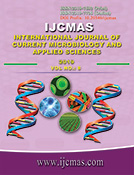


 National Academy of Agricultural Sciences (NAAS)
National Academy of Agricultural Sciences (NAAS)

|
PRINT ISSN : 2319-7692
Online ISSN : 2319-7706 Issues : 12 per year Publisher : Excellent Publishers Email : editorijcmas@gmail.com / submit@ijcmas.com Editor-in-chief: Dr.M.Prakash Index Copernicus ICV 2018: 95.39 NAAS RATING 2020: 5.38 |
The study was aimed to assess the uses of antibiotic residues consumed in Khartoum State; Sudan. The problem of the study is the usage of antibiotics to food producing animals for treatment, prophylaxis and as growth promoters results in deposition of their residues in various organs and tissues. These residues after consumption via meat, milk and their products may cause adverse side effect such as toxicity, bacterial resistance, allergic reactions and many different side effect may lead to death. Veterinarians daily use many kinds of antibiotics in farm animals leading to exposure to potential health hazards associated with the antibiotic misuse practices due to their ignorance of the importance of correct use of antibiotics including the overdoses, extra label and application through un trained staff (farm worker). For data collection a questionnaire with some questions directed to the veterinarians and 25 veterinarians were randomly chosen. Also interviews were carried out with the official staff to know the different risks associated with the presence of antibiotic residues. The data were analyzed by Statistical Package of Social Science (SPSS) software. The result showed that, 60% of veterinarians give tips to the owners about the withdrawal period and 60% of them did not adhere to dosage in the prescription. On the other hand 92% of antibiotics administration follow-up is done by the owners and workers while 20% of the owners were adhered with the guidelines, and 8% of the veterinarians were continued the treatment by their self. The Oxytetracycline group, represent about 72% of antibiotics groups used for the animals treatment. The study recommended that veterinarians and owners should be aware, to control the withdrawal period and misuse of antibiotics, and finally using the law and legalization to avoid the side effect on livestock and human.
 |
 |
 |
 |
 |